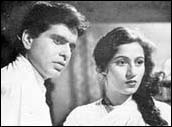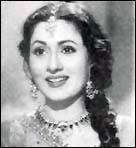Both Dilip Kumar and her father had to stand by
and watch the disintegration
of a beautiful human
being before their eyes.
 Dilip Kumar never came back and the Naya Daur court case
and its fallout put an effective end to any chance of redeeming
the relationship. Too much was said and done that could not be
forgotten. Madhubala who was shocked and angry in the aftermath
of the case made an attempt at reconciliation, but Dilip Kumar
evidently could not forgive her. Dilip Kumar never came back and the Naya Daur court case
and its fallout put an effective end to any chance of redeeming
the relationship. Too much was said and done that could not be
forgotten. Madhubala who was shocked and angry in the aftermath
of the case made an attempt at reconciliation, but Dilip Kumar
evidently could not forgive her.
The well-known journalist and
writer, Bunny Reuben, speaks of her unsuccessful effort to reach
out to the estranged Dilip. Assigned to do a feature on her for
Filmfare, Reuben was surprised to be given an appointment at her
home, not at the studios as usual. He was further taken aback
when he was escorted straight to her room upstairs. She seemed
very keen to meet him and it occurred to him that it was his well-known
proximity to Dilip Kumar that had prompted her to send for him
in preference to her friend, Gulshan Ewing.
The article was outlined
to her but in the meeting which stretched to over two hours, she
spoke instead on the subject closest to her heart. "She wanted
to talk only about her Yusuf Khan -- doing the feature was secondary.
As she proceeded to unburden herself of all the intimate and hurtful
details of their relationship, she put her head on my shoulders
and wept uncontrollably," recollects Reuben.
Reuben understood that she was trying to send a message across
to Dilip. "She wanted me to go and convince him how badly
he had treated her and how much she still loved him." Moved
by her tears, he looked for a suitable opportunity to report the
whole episode to Dilip Kumar, but found that Dilip was in no mood
to listen.
He had hardly gone beyond the opening sentence: "She
still carries a torch for you Yusuf," when he was cut short and
curtly dismissed by the angry retort: "What bloody torch?"
Not even the essentials of his two-hour conversation with the
unhappy Madhubala could be conveyed. In keeping with the spirit
of the age, and Filmfare's policy in particular, the star's troubled
outpourings were not betrayed in print. There was no 'scoop'.
Meanwhile, Mughal-e-Azam was still on the floors. Its shooting
constantly brought Dilip and Madhubala together but could not
heal the scars. Unable to work out a rapprochement, Madhubala
channelised her distress and pent-up grief into her characterization
of the similarly unfortunate Anarkali. The role assumed sublime
proportions -- but Dilip Kumar and Madhubala no longer spoke to
each other. It was exactly what Ataullah Khan had hoped for, but
did he want it at quite this price? Even he could not have bargained
for the utter havoc such a development played with his daughter's
life.
Dilip Kumar had loved Madhubala, but would marry her only on his
terms. Her father had loved her too, but laid down his own terms
and conditions at every stage. Finally, both had to stand by and
watch the disintegration of a beautiful human being before their
eyes.
Filmdom's most captivating star, around whom a thousand fantasies
were spun, remained sadly bereft of her own personal happiness:
Happiness has been a will-o'the-wisp. I stretch my hand to grasp
it and it eludes me mockingly. Life is a process of unending search
and I must be content with what occasional happiness I find along
the way. It must really be sought within myself but what is within
me is but a tangled mass of rebuffs, hurts, broken promises and
cruelties. There is so much I must forget, not because I want
to but because I must. Yet, how difficult it is to forget.
And so the meaning of happiness becomes narrower and narrower
as I devote more and more of my time to my work -- do obliterate
memories.
Her name was already synonymous with grace and loveliness. By
the time she died, it had become synonymous with pain and misfortune.
Her greatest triumph and her biggest weakness was always her heart.
Love had elevated her, brushing her lie with its grandeur and
glory, but a tired, overburdened heart had just as surely crushed
her.
Madhubala's reflections at this point are a chilling evidence
of the disastrous consequences of the break-up on her mind and
heart. All the underlying bitterness, the sense of betrayal and
dejection come through as she speaks of 'the innumerable
sorrows and few joys that life had given her.'
 The sum total of my life is a bitter experience which is coiled
tight like a spring within my heart and when released hurts excruciatingly.
It is true that one learns something from every experience but
when the experience is evil, the shock is so great that one feels
as though one can never recover from it.
The sum total of my life is a bitter experience which is coiled
tight like a spring within my heart and when released hurts excruciatingly.
It is true that one learns something from every experience but
when the experience is evil, the shock is so great that one feels
as though one can never recover from it.
I am very emotional. I have always lived my life with my heart.
For that I have suffered more than is necessary. I have been hurt.
Excerpted from Madhubala, her Life, Her Times, by Khatija Akbar, UBS Publishers Distributors, 1997, Rs 160, with the publisher's permission.
Back
|

